- Open main menu
- Open search popup
- Philippines
- Close main menu
- Breaking News
- Current Affairs
- Community News
- New Openings
- Activities & Attractions
- Food Reviews
- Food Guides
- Nightlife Guides
- Hotel Reviews
- Hotel Guides
- Family & Kid-friendly
- Photo Spots
- Monthly Lobangs
- Sports & Fitness
- Beauty & Wellness
- Volunteering
- Phillippines
- New Zealand
- Africa & Middle East
- Rest of World
- Travel Guides & Tips
- Perspectives
- Inspiration
- Dating & Relationships
- Self-Improvement
- Upcoming Events
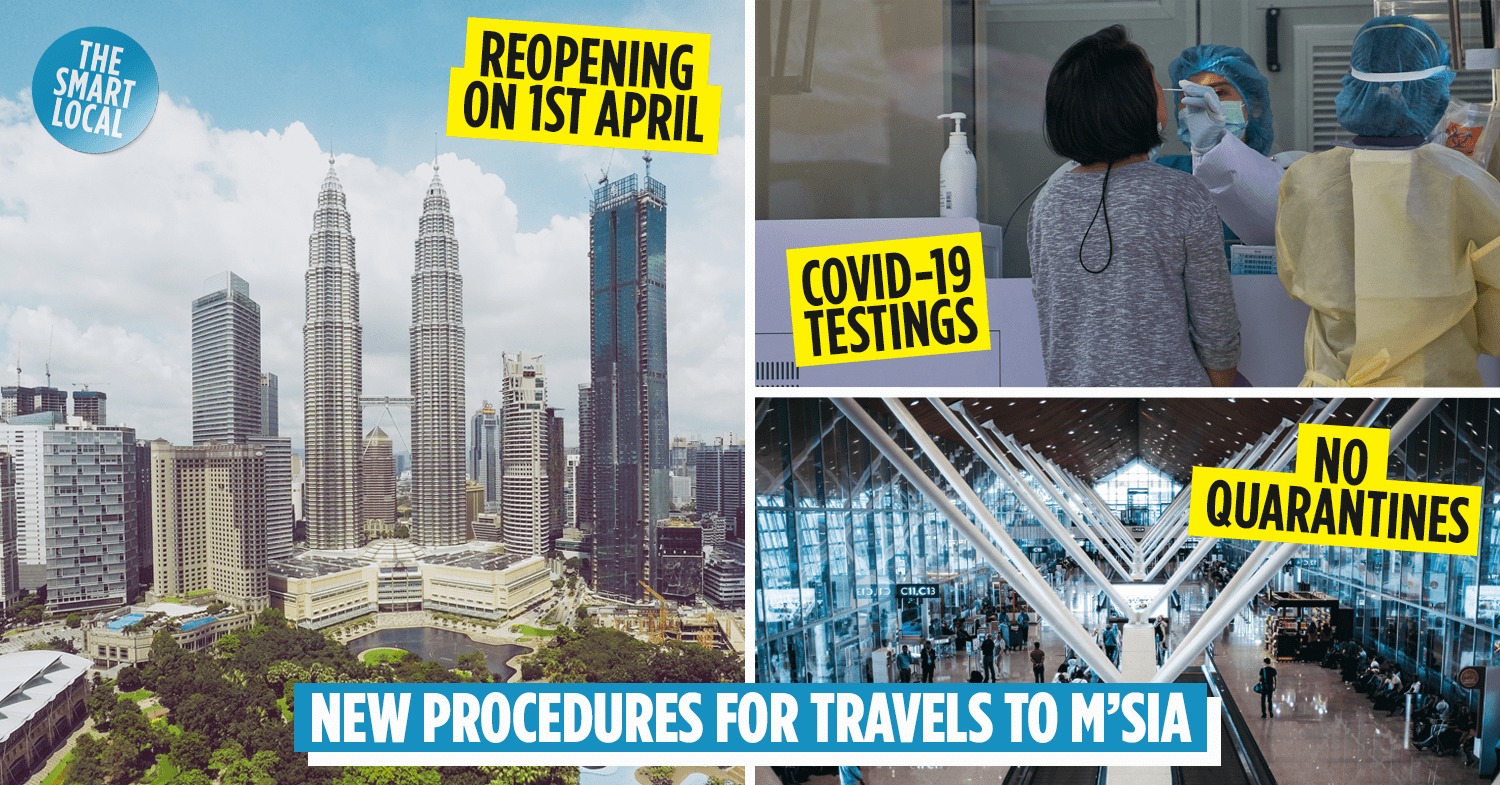

Guide To Entering M’sia From 1st April: No Quarantine Requirements & Covid-19 Tests For Travellers
New procedures for travel to Malaysia from 1st April
Ever since Malaysia announced that its international borders will reopen to all on 1st April 2022, many foreign travellers have been counting down the days to execute their vacation plans and reunite with loved ones here again. But let’s admit it – figuring out new travel guidelines can be quite daunting.
Here, we’ve rounded up standard operating procedures (SOPs) for travellers entering Malaysia from 1st April so you can have a hassle-free and safe trip when our country reopens its borders.
Quarantine-free travels for the fully vaccinated
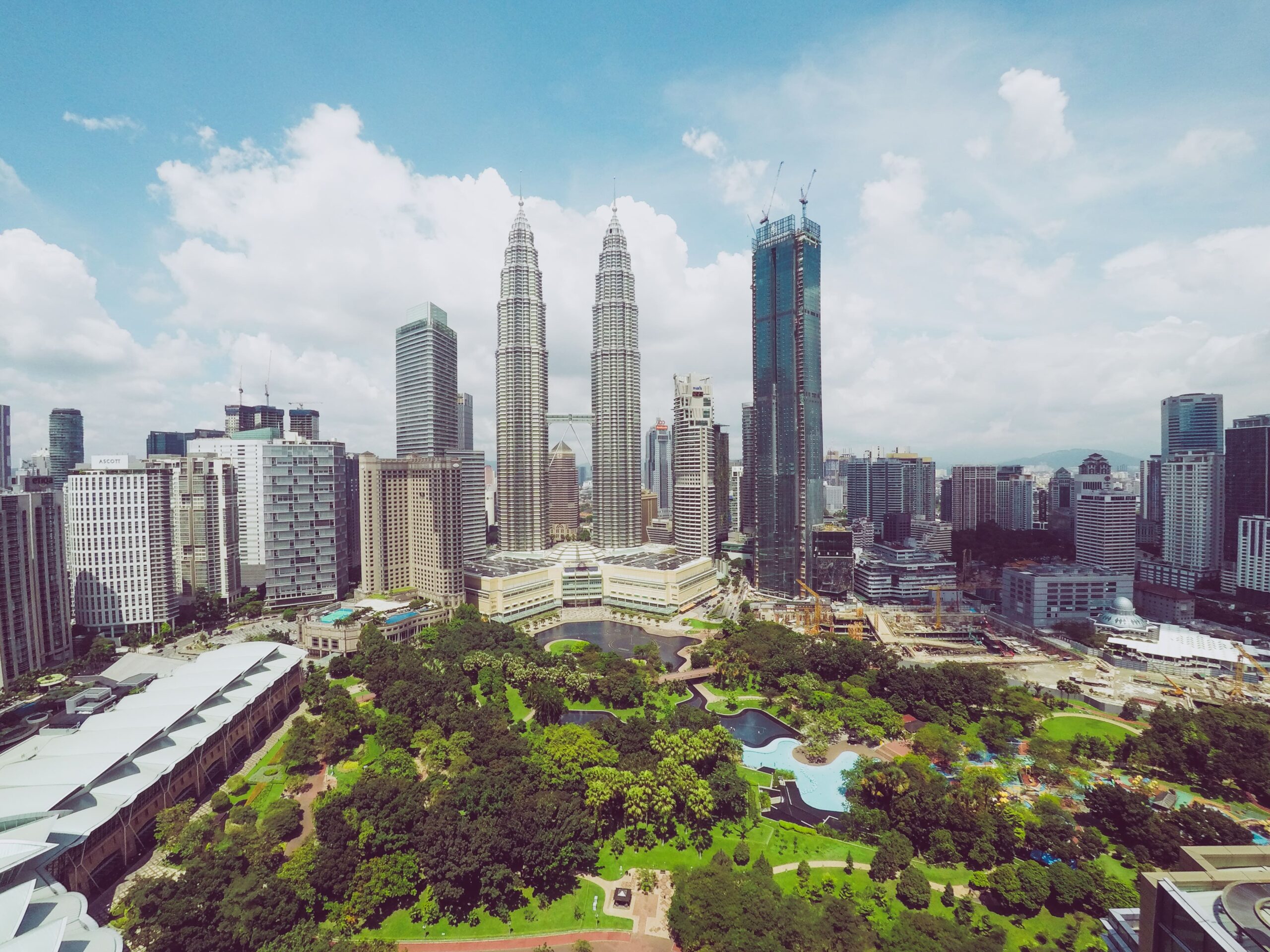
One thing that’s on all our minds when it comes to planning trips abroad at this moment is quarantine. For fully vaccinated travellers and travellers aged 17 years and below, you’ll be glad to know that you can now enjoy quarantine-free travels to Malaysia, beginning 1st April.
The current doses needed to be considered fully vaccinated by Malaysian authorities are:
- Sinovac and Sinopharm – three doses , for all over 18 years old
- Pfizer, Moderna, AstraZeneca, Covaxin, Covishield, Novavax & Sputnik V – two doses for those between 18 and 59 years old; three doses for those 60 years old and above
- CanSino, Johnson & Johnson, Sputnik Light – one dose for those between 18 and 59 years old; two doses for those 60 years old and above
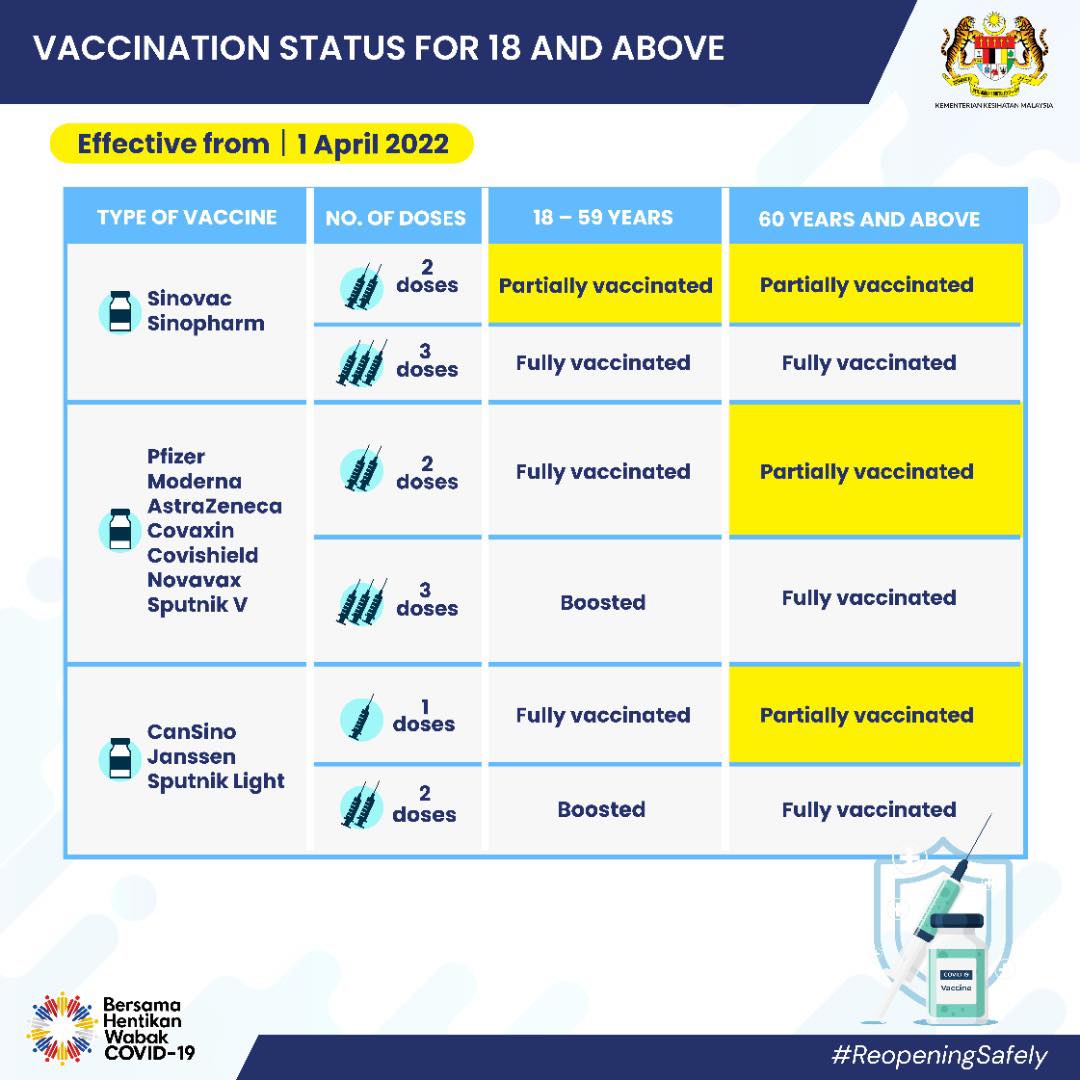
If your vaccine brand is not on the list, fret not – Malaysia will also accept vaccines that aren’t recognised by the World Health Organisation’s Emergency Use List. The vaccine brands will just need to be approved by regulatory agencies in your country.
You can verify your Covid-19 digital vaccination certificate on Malaysia’s MySafeTravel online portal here before your travels. We recommend doing this two weeks ahead of your date of departure, just to be safe.
Five-day quarantine for partially vaccinated & unvaccinated
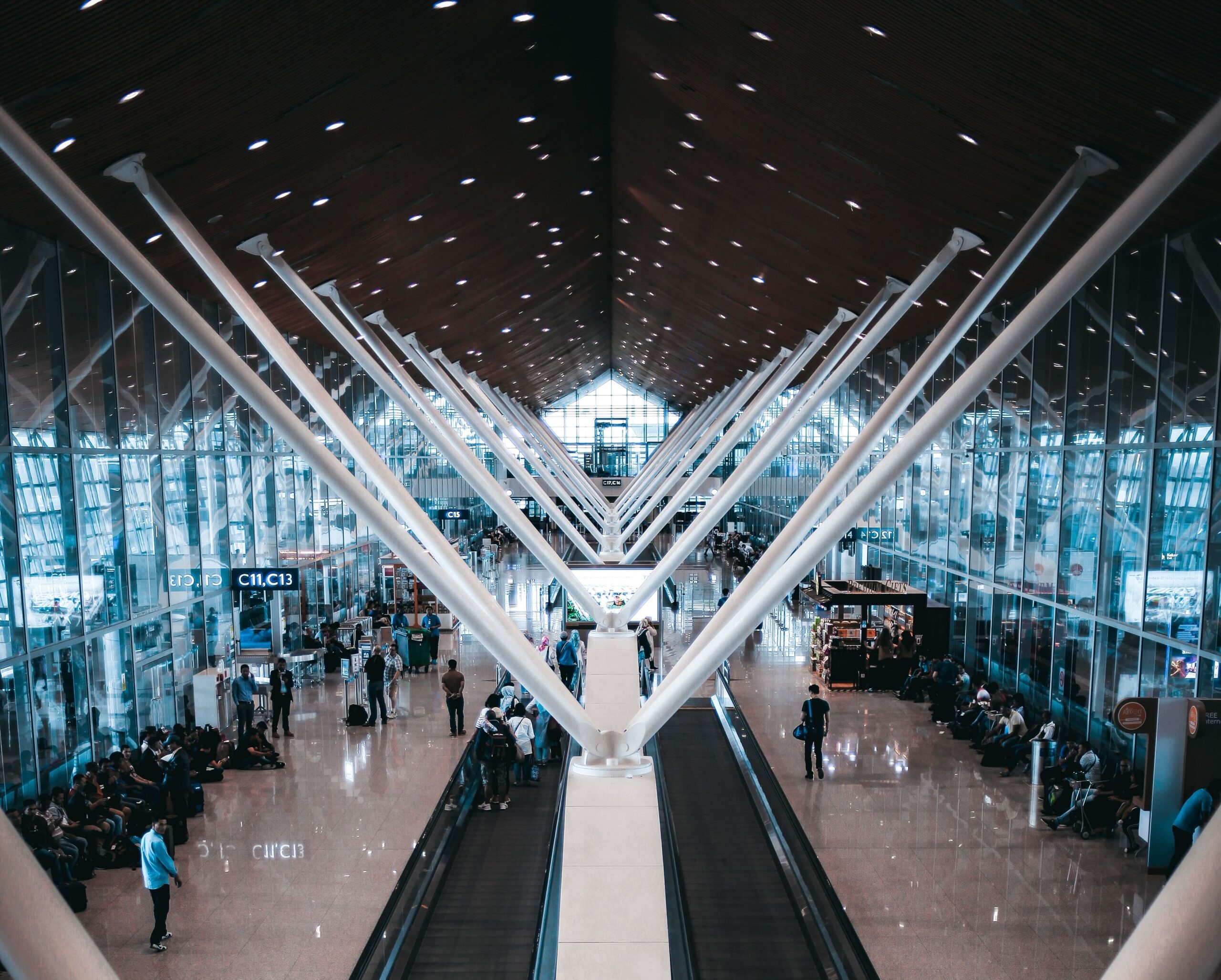
As much as we can now enjoy travelling to Malaysia again, mandatory quarantine rules still apply to those who are not fully vaccinated.
Individuals who are partially vaccinated or unvaccinated will need to observe a mandatory 5-day quarantine period at their own accommodation. Covid-19 testings will be required during this quarantine period, with possible quarantine extensions if you test positive for Covid-19.
These are the steps you’ll have to take during your quarantine:
- undergo a RT-PCR test on Day 4 or a RTK-Ag test on Day 5
- produce a negative test result on Day 5 to be released from quarantine
- observe another five days of quarantine if tested positive for Covid-19
Pre-departure and on-arrival tests
Likewise, travellers will still be required to undergo a RT-PCR test two days before departure and a RTK-Ag test within 24 hours upon arrival in Malaysia. If your result is positive or inconclusive, you won’t be allowed to board your flight.
Pre-departure test
Pre-departure test applies to all travellers 7 years old and above, while those 6 years old and below won’t need to undergo any pre-departure or on-arrival testings.
An exception applies to travellers from Singapore, who can take a RT-PCR test or a professional RTK-Ag test.
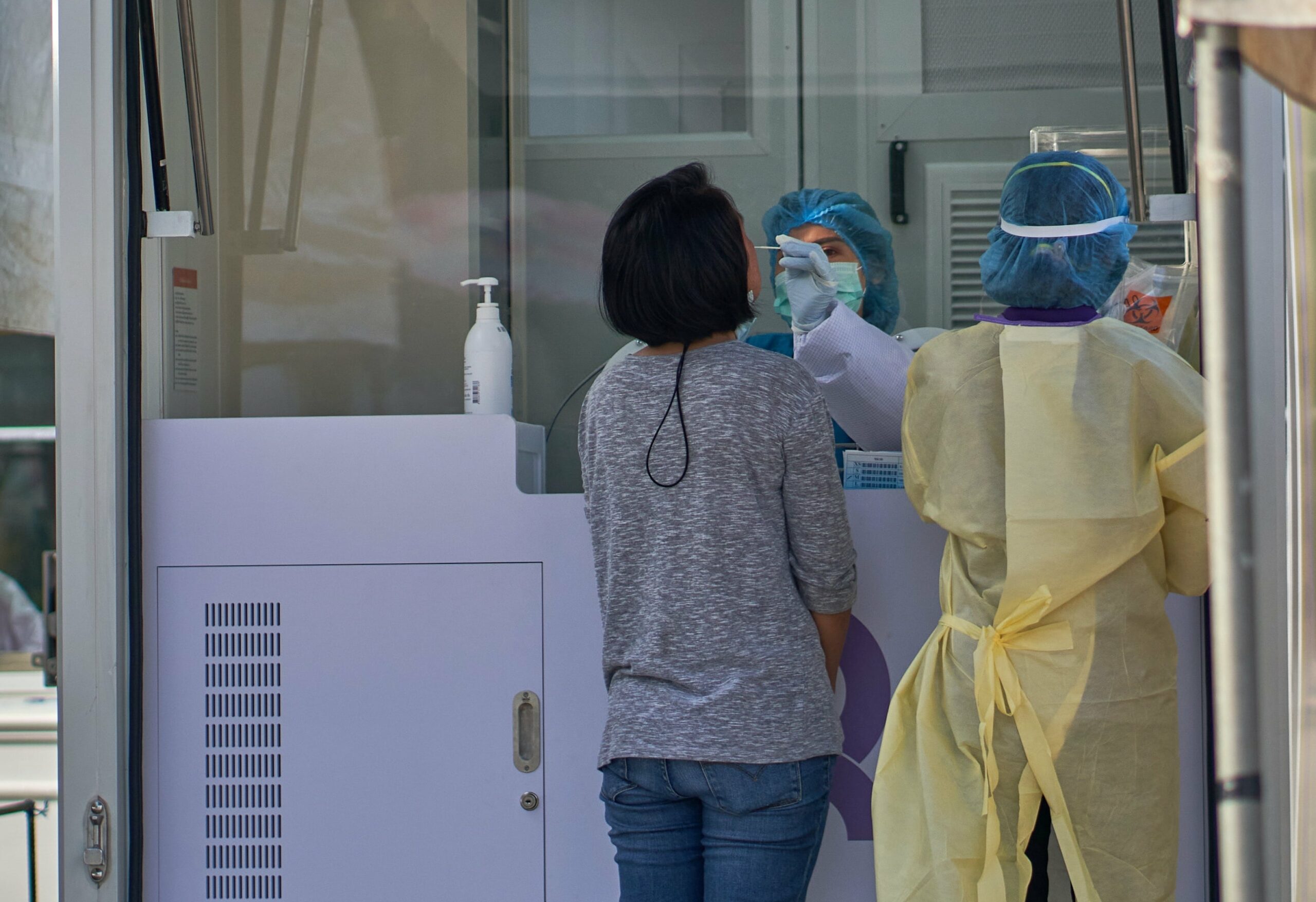
If you’ve previously tested positive for Covid-19 and recovered between the last 6-60 days before your date of departure for Malaysia, you can also opt for a RTK-Ag test.
However, you’ll need to provide the following additional documents at check-in:
- Covid-19 positive result, with date clearly stated
- Doctor’s letter confirming Covid-19 recovery
Do note that these documents must be written in English, or supported with a certified translation.
On-arrival test
The same rules apply for on-arrival test . All travellers 7 years old and above are required to get professionally tested within 24 hours of arrival at any private health facility or at the airport, where Covid-19 Breathalyser and RTK-Ag testing services can be accessed.
Here’s a list of private hospitals and clinics , approved by the Ministry of Health Malaysia (Kementerian Kesihatan Malaysia), that provide Covid-19 testing services.
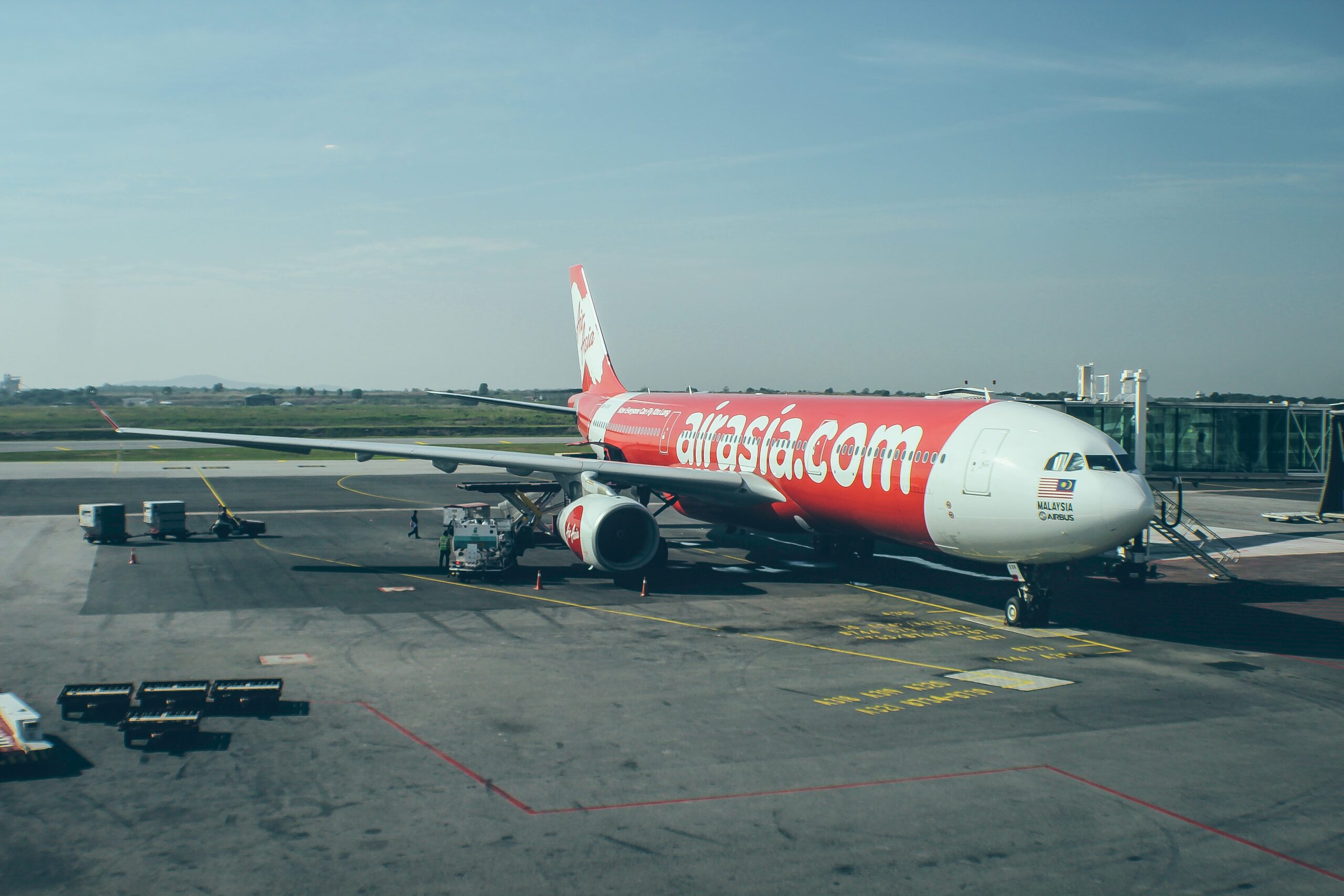
Aside from those under 6 years of age, travellers from Singapore will also be exempted from on-arrival tests.
Travellers will also want to note that they’ll have to pay for all Covid-19 tests, and that self-tests will not be accepted. If no on-arrival test is taken, travellers will be required to quarantine until they provide proof of a negative test result.
Download, register and activate MySejahtera
For a stress-free travel process, travellers to Malaysia will be obligated to create an account on the MySejahtera app prior to departure. This is so a Digital Pre-Departure Form (DPDF), which can be found under the ‘Traveller’ icon on the app, can be completed.
You’ll need this form on hand with you during check-in and boarding for your flight.
The form contains 22 questions, and will take you less than 5 minutes to complete. Question fields include stating your personal details, sharing your purpose of travel, naming your vaccine brand, and selecting your mode of travel.
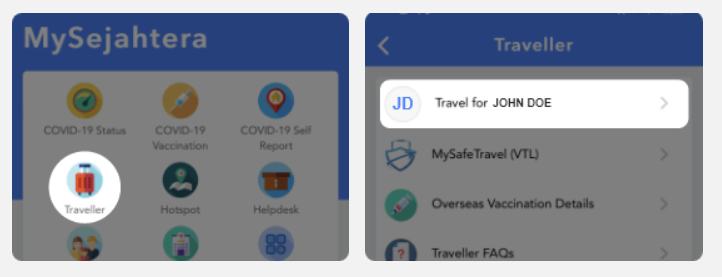
Should you be fully-vaccinated , a Digital Traveller Card will be issued to you upon submission of the form. However, partially vaccinated or unvaccinated travellers will be issued a Digital Home Surveillance Order (HSO) , which means that a 5-day quarantine will be mandatory upon arrival.
This app is also a required use when travelling around in Malaysia. It’s currently used by Malaysians to show their vaccination status and check-in at premises, such as eateries, malls, and grocery stores, for contact tracing.
Covid-19 travel insurance for short-term visitors
For short-term foreign tourists, it is important to note that Covid-19 travel insurance with a minimum coverage of USD20,000 must be acquired before your travels. This is a must, regardless of vaccination or recovery status, and can be purchased from insurers in your own country or Malaysia.
This requirement will be exempted for the following individuals:
- Long-Term Social Pass
- Expatriates Pass
- Student Pass
- Resident Pass
- Permanent Resident Pass
- Spouses of Malaysian citizens
- Children of Malaysian citizens
- Foreign workers including foreign helpers
For Malaysia-Singapore land border crossing
In addition to our country’s borders reopening, Malaysia-Singapore land border crossing will likewise reopen on 1st April with updated travel procedures.
For land travel – which covers all modes of transport, including private vehicles, motorcycles, and buses – all fully vaccinated travellers and those 12 years and below from Singapore can enter Malaysia without any quarantine or testing.
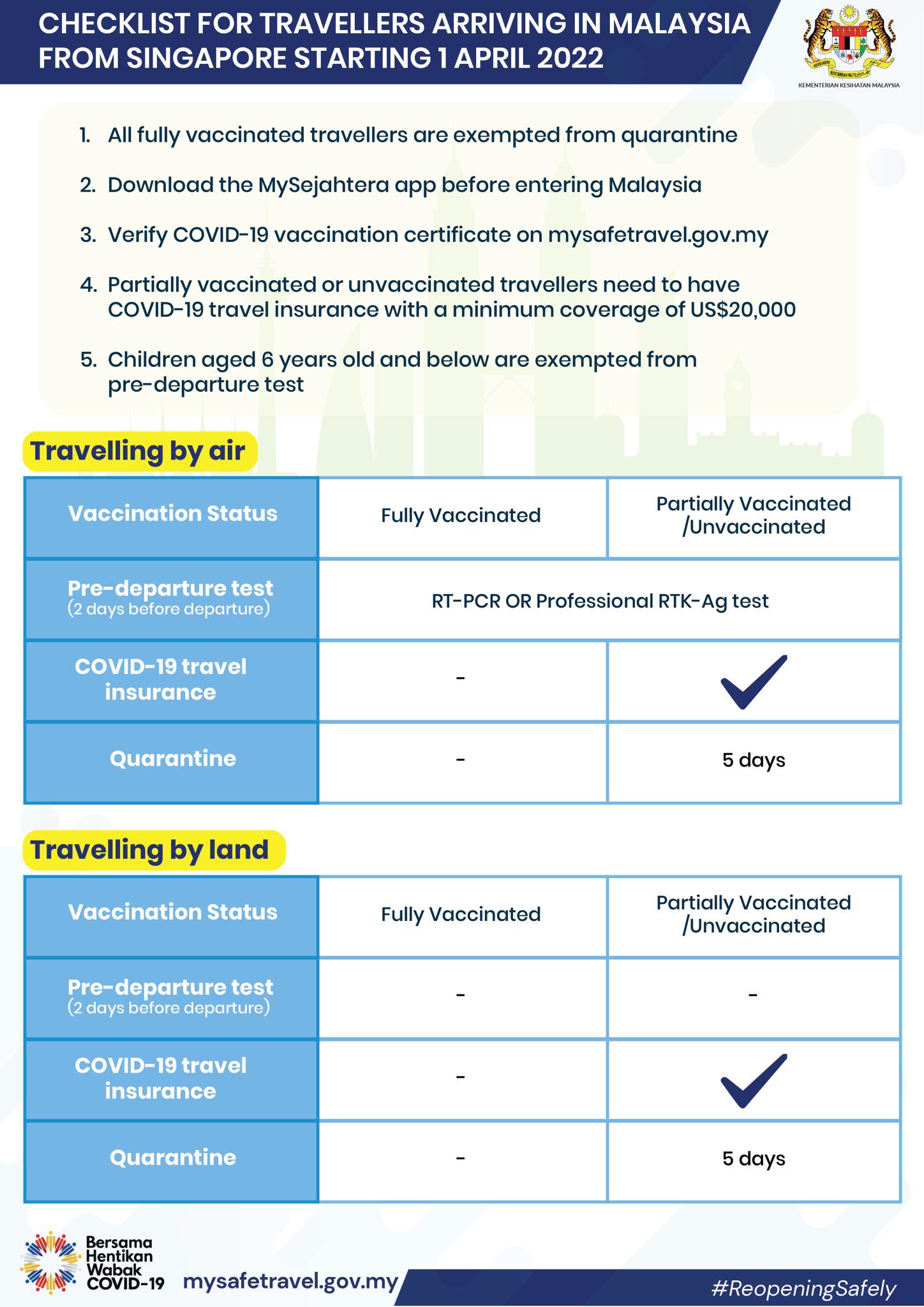
However, if you’re partially vaccinated or unvaccinated, you can skip pre-departure testing too but will need to quarantine for five days and get a Covid-19 travel insurance.
New travel procedures for travellers to Malaysia
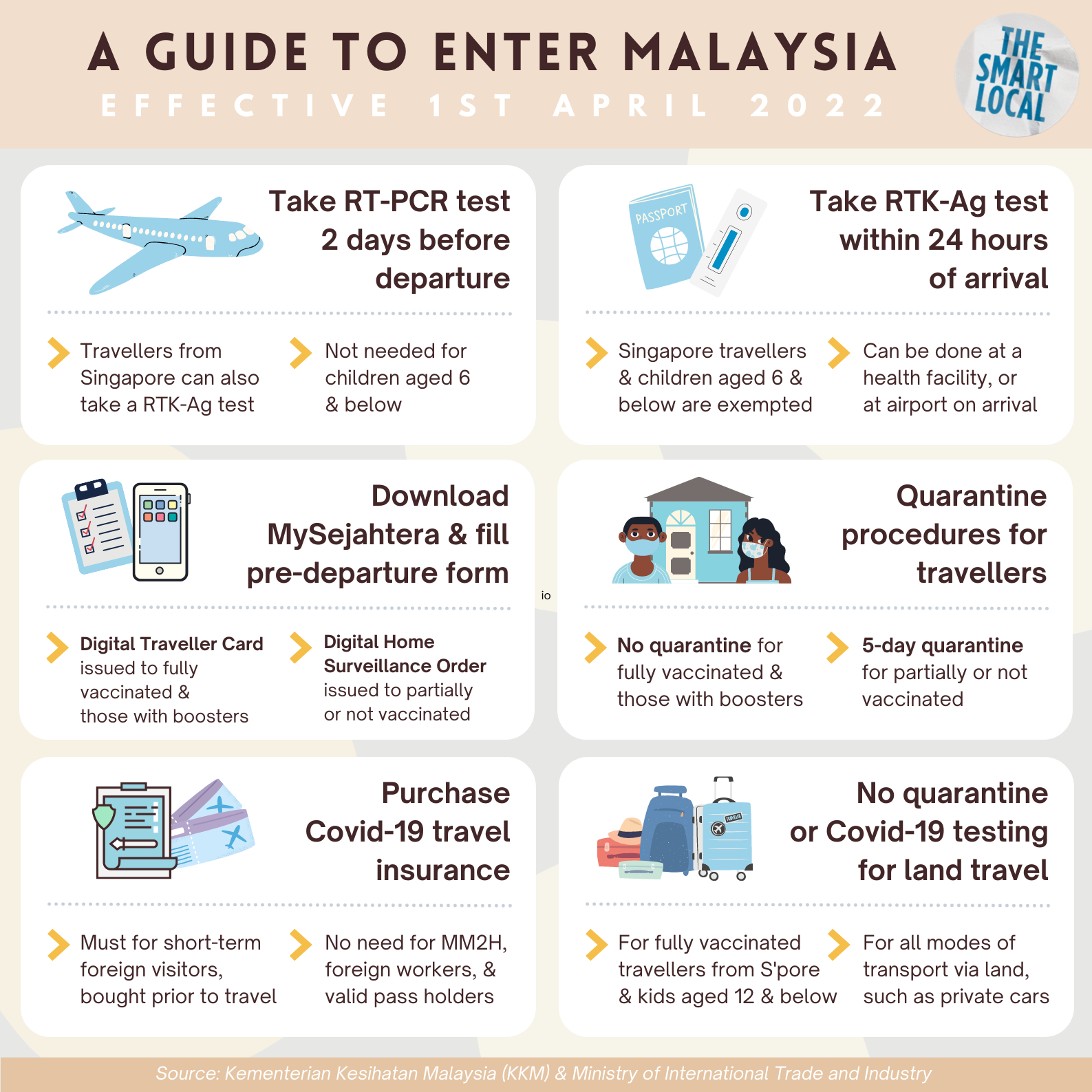
Malaysia’s transition to Endemic Phase is no doubt exciting for returning citizens and foreign travellers. The easing guidelines part of the new travel procedures to Malaysia signal a hopeful step towards freely travelling in and out of the country again.
As eager as everyone is to visit friends and family again and discover what our country has to offer, it is still wise to take precautions when travelling around.
Here’s wishing you safe travels ahead.
Read more here:
- KLIA & LIA are two of Asia Pacific’s best airports
- 31 things to do in and around Kuching
- 53 things to do in Johor Bahru
Cover image adapted from: Unsplash / Sadie Teper , Unsplash / Norbert Braun , and Unsplash / AR
Additional reporting by Janet Cho.
- Travel Advisories |
- Contact Us |
- MyTravelGov |
Find U.S. Embassies & Consulates
Travel.state.gov, congressional liaison, special issuance agency, u.s. passports, international travel, intercountry adoption, international parental child abduction, records and authentications, popular links, travel advisories, mytravelgov, stay connected, legal resources, legal information, info for u.s. law enforcement, replace or certify documents.
Share this page:
Malaysia Travel Advisory
Travel advisory july 24, 2024, malaysia - level 1: exercise normal precautions.
Reissued after periodic review with minor edits.
Exercise normal precautions in Malaysia. Some areas have increased risk. Read the entire Travel Advisory. Exercise Increased Caution in:
- The eastern area of Sabah State due to kidnapping .
Read the country information page for additional information on travel to Malaysia. If you decide to travel to Malaysia:
- Enroll in the Smart Traveler Enrollment Program ( STEP ) to receive Alerts and make it easier to locate you in an emergency.
- Follow the Department of State on Facebook and Twitter .
- Review the Country Security Report for Malaysia.
- Visit the CDC page for the latest Travel Health Information related to your travel.
- Prepare a contingency plan for emergency situations. Review the Traveler’s Checklist .
Eastern Area of Sabah State – Level 2: Exercise Increased Caution
There is a threat of kidnappings-for-ransom from both terrorist and criminal groups. These groups may attack with little to no warning, targeting coastal resorts, island resorts, and boats ferrying tourists to resort islands.
The U.S. government has limited ability to provide emergency services to U.S. citizens in eastern Sabah as U.S. government employees must obtain special authorization to travel to parts of eastern Sabah.
Travel Advisory Levels
Assistance for u.s. citizens, malaysia map, search for travel advisories, external link.
You are about to leave travel.state.gov for an external website that is not maintained by the U.S. Department of State.
Links to external websites are provided as a convenience and should not be construed as an endorsement by the U.S. Department of State of the views or products contained therein. If you wish to remain on travel.state.gov, click the "cancel" message.
You are about to visit:

Retail Internet Banking

I'm looking for

Popular tag
You are now leaving AffinAlways.com
Please be informed that upon entering a third party website, AFFIN BANK’s privacy policy ceases to apply and you are advised to read the privacy policies of the third party website. AFFIN BANK gives no warranty as to the entirety, accuracy or security of the linked third party website or any of its content.
As such, AFFIN BANK shall not be responsible or liable in connection with the content of or the consequences of accessing the third party website.
SmartTraveller Enhanced (Single Trip Plan)
Travel smart.

Loss of Use of Entertainment Tickets
Reimburse for unused and irrecoverable deposits or payment made for entertainment (tourist attraction centres/concerts) ticket charges due to death, hospitalisation or due to adverse weather condition or natural disaster at planned destination.

Medical, Hospital and Treatment Expenses
Reimburse expenses (including cost of emergency dental treatment) incurred during accident or sickness.

Accidental Death and Permanent Disablement
Pay up to RM350,000 for Accidental Death and Permanent Disablement of Insured Person

Baggage and Personal Effects
Pay for loss of or damage to your baggage and personal effects due to theft or negligence of the common carrier. Maximum limit for any one item or pair or set of articles is up to RM500. Maximum limit per baggage is up to RM300.

Cancellation and Postponement
Reimburse for irrecoverable travel and accommodation expenses paid in advance due to death, serious injury or illness to you or your immediate family or a natural disaster at your destination, provided that the insurance is purchased not less than 14 days prior to the commencement of the scheduled trip.

Pandemic Cover for Overseas Trip only
Option to extend cover for Pandemic events. This covers for Trip Cancellation, Trip Curtailment, Medical, Hospital and Treatment Expenses, Hospital Allowances, Emergency Medical Evacuation, Emergency Medical Repatriation and Repatriation of Mortal Remains if you are diagnosed with a pandemic illness (Medical Expenses Top Up does not apply).
Eligibility
- Customers of Affin Bank
- The available plans are Individual Standard (age <65), Individual Senior (age ≥ 65) and Family plan.
- Family plan includes You, Your spouse and all Your children. For Family plan, family limit applies for the total sum of coverage. * Not applicable for persons aged 65 and above.
Important Information
- Product Disclosure Sheet
- Proposal Form
You may also like...

Comprehensive protection for you and your family 24/7 anywhere in the world.
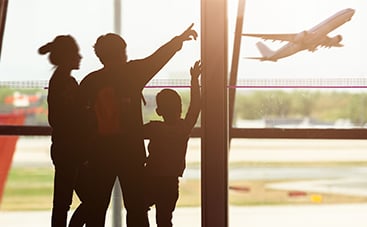
Cover you and your family when travelling abroad.

Safeguard you and your loved ones from unexpected events with affordable premium. Simple online application with no medical check-up required.
How to reach us?
There are more ways to reach us

Back to top

Copyright 2018 Affin Bank Berhad (25046-T).

Countries, economies and regions
Select a country, economy or region to find embassies, country briefs, economic fact sheets, trade agreements, aid programs, information on sanctions and more.
International relations
Global security.
- Australia and sanctions
- Australian Safeguards and Non-proliferation Office (ASNO)
- Counter-terrorism
- Non-proliferation, disarmament and arms control
- Peacekeeping and peacebuilding
Regional architecture
- Asia Pacific Economic Cooperation (APEC)
- Association of Southeast Asian Nations (ASEAN)
- East Asia Summit (EAS)
- Australia and the Indian Ocean region
- Pacific Islands regional organisations
Global themes
- Child protection
- Climate change
- Cyber affairs and critical technology
- Disability Equity and Rights
- Gender equality
- Human rights
- Indigenous peoples
- People Smuggling, Human Trafficking and Modern Slavery
- Preventing Sexual Exploitation, Abuse and Harassment
- Australia’s treaty-making process
International organisations
- The Commonwealth of Nations
- United Nations (UN)
- World Trade Organization
Foreign Arrangements Scheme
Trade and investment, about free trade agreements (ftas).
- The benefits of FTAs
- How to get free trade agreement tariff cuts
- Look up FTA tariffs and services market access - DFAT FTA Portal
- Discussion paper on potential modernisation – DFAT FTA Portal
About foreign investment
- The benefits of foreign investment
- Investor-state dispute settlement (ISDS)
- Australia's bilateral investment treaties
- Australia's foreign investment policy
For Australian business
- Addressing non-tariff trade barriers
Expo 2025 Osaka, Kansai
Stakeholder engagement.
- Ministerial Council on Trade and Investment
- Trade 2040 Taskforce
- First Nations trade
Australia's free trade agreements (FTAs)
- ASEAN-Australia-New Zealand (AANZFTA)
- Chile (ACLFTA)
- China (ChAFTA)
- Hong Kong ( A-HKFTA & IA)
- India (AI-ECTA)
- Indonesia (IA-CEPA)
- Japan (JAEPA)
- Korea (KAFTA)
- Malaysia (MAFTA)
- New Zealand (ANZCERTA)
- Peru (PAFTA)
- Singapore (SAFTA)
- Thailand (TAFTA)
- United Kingdom (A-UKFTA)
- USA (AUSFTA)
- Trans-Pacific Partnership (TPP)
- European Union (A-EUFTA)
- India (AI-CECA)
- Australia-UAE Comprehensive Economic Partnership Agreement
- Australia-Gulf Cooperation Council (GCC)
Trade and investment data, information and publications
- Fact sheets for countries and regions
- Australia's trade balance
- Trade statistics
- Foreign investment statistics
- Trade and investment publications
- Australia's Trade through Time
WTO, G20, OECD, APEC and IPEF and ITAG
Services and digital trade.
- Service trade policy
- Australia-Singapore Digital Economy Agreement
- Digital trade & the digital economy
Development
Australia’s development program, performance assessment.
- Development evaluation
- Budget and statistical information
Who we work with
- Multilateral organisations
- Non-government organisations (NGOs)
- List of Australian accredited non-government organisations (NGOs)
Development topics
- Development issues
- Development sectors
2030 Agenda for Sustainable Development
- Sustainable Development Goals
Where we deliver our Development Program
Humanitarian action.
Where and how Australia provides emergency assistance.
People-to-people
Australia awards.
- Australia Awards Scholarships
- Australia Awards Fellowships
New Colombo Plan
- Scholarship program
- Mobility program
Public diplomacy
- Australian Cultural Diplomacy Grants Program
- Australia now
- UK/Australia Season 2021-22
Foundations, councils and institutes
- Australia-ASEAN Council
- Australia-India Council
- Australia-Indonesia Institute
- Australia-Japan Foundation
- Australia-Korea Foundation
- Council for Australian-Arab Relations (CAAR)
- Council on Australia Latin America Relations (COALAR)
International Labour Mobility
- Pacific Labour Mobility Scheme
- Agriculture Visa
Australian Volunteers Program
Supporting organisations in developing countries by matching them with skilled Australians.
Sports diplomacy
Australia is a successful global leader and innovator in sport.
A global platform for achievement, innovation, collaboration, and cooperation
About Australia
Australia is a stable, democratic and culturally diverse nation with a highly skilled workforce and one of the strongest performing economies in the world.
Australia in Brief publication
This is the 52nd edition of Australia in Brief, revised and updated in February 2021
Travel advice
To help Australians avoid difficulties overseas, we maintain travel advisories for more than 170 destinations.
- Smartraveller – travel advice
International COVID-19 Vaccination Certificate
Prove your COVID-19 vaccinations when you travel overseas.
- Services Australia
The Australian Passport Office and its agents are committed to providing a secure, efficient and responsive passport service for Australia.
- Australian Passport Office
24-hour consular emergency helpline
- Within Australia: 1300 555 135
- Outside Australia: +61 2 6261 3305
- Getting help overseas
- Visas for Australians travelling overseas
- Visas to visit Australia

Be a smart traveller these holidays
Media Release
Australians about to head overseas for a well-deserved holiday should keep in mind the following tips to ensure they stay safe and healthy during their trip.
- An Australian passport does not make you immune from the law in other countries. The Australian Government cannot intervene in foreign judicial processes and we cannot get you out of jail or detention.
- Take out appropriate travel insurance . Australians are urged to take out travel and medical insurance before they leave the country. In virtually all circumstances, the Government will not pay for your return home for medical treatment. See the recently published travel insurance buying guide to help you find the right cover.
- Every country is different, so know as much as you can before you go. We keep Australians up to date with more than 170 country-specific advisories which you can subscribe to at smartraveller.gov.au . There are currently 12 countries where we advise against all travel and another 36 where part of a country is rated as do not travel. Your travel insurance is unlikely to be valid in these areas.
- Some travellers are particularly vulnerable . Smartraveller includes practical advice for women , the LGBTI community , volunteers , families and seniors .
- Know who to contact. Make sure you have the emergency number of your insurance provider, as well as contacts for airlines, travel agents, banks, and family or friends back home. Australian consular officials can be contacted 24 hours a day, 7 days a week through our Consular Emergency Centre on 1300 555 135 (in Australia) or on +61 2 6261 3305 or SMS on +61 421 269 080. Download the free mobile Smartraveller app, and follow Smartraveller on Facebook and Twitter .
- Be as self-reliant as possible. Australians often have unrealistic or unreasonable expectations of what help we can offer. For details of what we can and cannot do, please review the Consular Services Charter and the Consular Strategy .
- Get the basics right. Make sure your passport has at least six months' validity from your planned date of return, and check that you have the right visas and vaccinations. Leave an itinerary with someone at home and keep in contact with them. You should also register with Smartraveller, in case of a serious emergency.
Following these tips will go a long way to ensuring that your holidays go smoothly. We hope all travellers have an enjoyable experience overseas during this holiday period.
Media enquiries
DFAT Media Liaison: 02 6261 1555

General Travel Information
The dfat smart traveller website located at www.smarttraveller.gov.au can give you valuable information when you’re travelling overseas..
It is recommended that you register your travel details prior to travelling. This information is treated with confidentiality and can make it easier for your friends and family to contact you overseas.
Organise your travel money:
Before you go:.
Find out what currency is used at your destination and check ATM availability.
Arrange a selection of methods for carrying your money overseas: Cash, traveller’s cheques, credit card, cash and travel money card.
Tell the bank the dates you are travelling.

Search Smartraveller

Philippines
Latest update.
Exercise a high degree of caution in the Philippines overall due to the threat of terrorism and violent crime.
Higher levels apply in some areas.
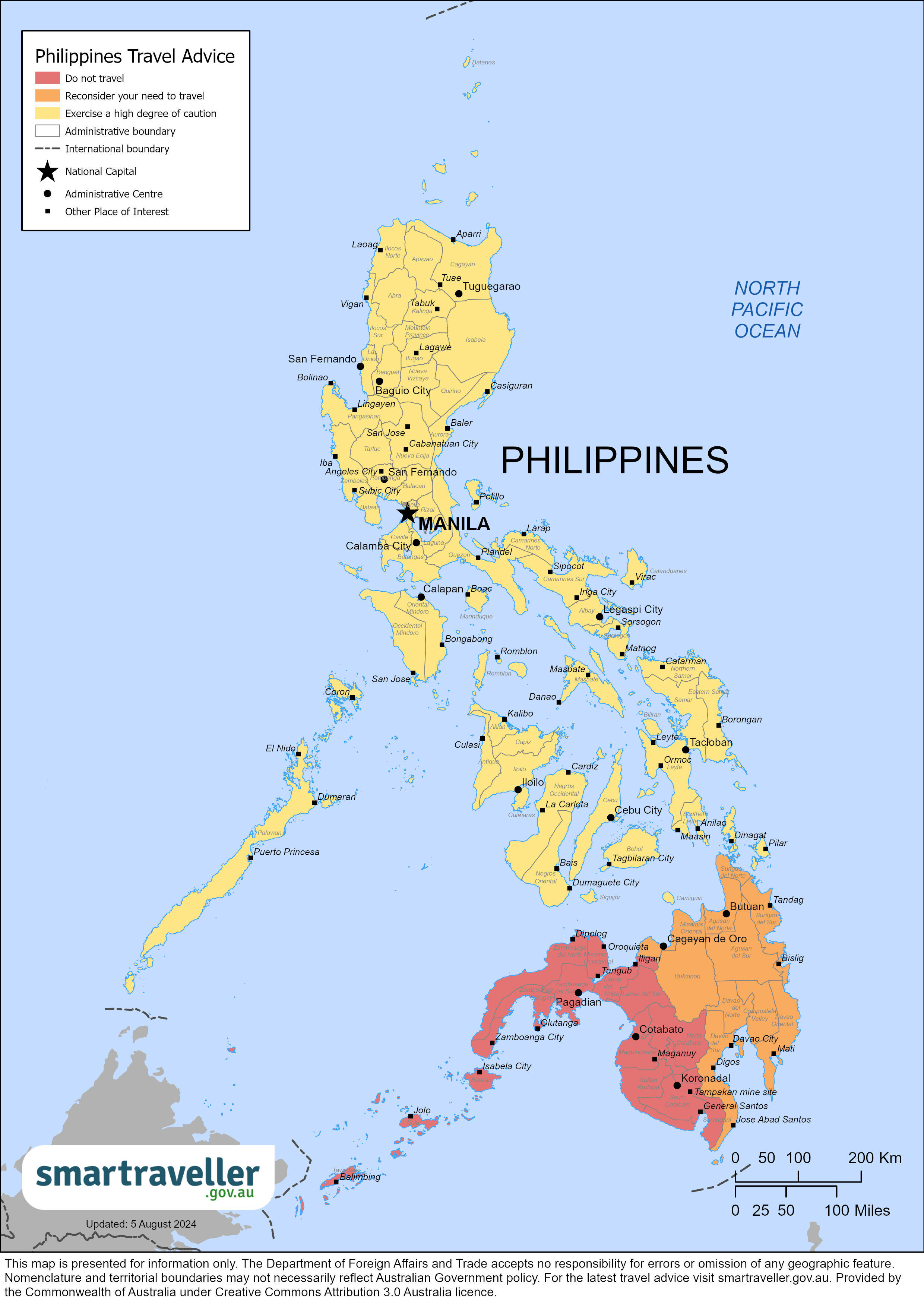
Philippines.pdf (PDF 1.92 MB)
Asia (PDF 2.29 MB)
Local emergency contacts
Fire and rescue services, medical emergencies.
Call 117 for the Police National Operations Center hotline.
Or contact your nearest Philippines National Police (PNP) station.
Advice levels
Exercise a high degree of caution in the Philippines overall.
Exercise a high degree of caution in the Philippines overall due to the threat of terrorism and violent crime.
See Safety .
Do not travel to:
- central and western Mindanao, including the Zamboanga Peninsula;
- the Sulu Archipelago; and
- the southern Sulu Sea area
due to the very high threat of terrorism and kidnapping.
Reconsider your need to travel to eastern Mindanao (excluding Camiguin, Dinagat and Siargao Islands).
Reconsider your need to travel to eastern Mindanao (excluding Camiguin, Dinagat and Siargao Islands), due to political violence and the threat of terrorism.
- Terrorist attacks could occur anywhere in the Philippines. Possible targets include aviation and airports, public transport, hotels, shopping malls, restaurants, major events, places of worship and tourist areas. Be alert to possible threats. On 3 December 2023 there was a terrorist attack in Marawi City resulting in four dead and many injured, leading to heightened security arrangements in Mindanao and elsewhere, including Manila.
- Kidnappings occur in the Philippines and kidnappers may target popular tourist areas. The threat of kidnapping and piracy in the southern Philippines is high, especially in the area of the Sulu Archipelago. If you travel to the southern Philippines despite our advice, get professional security advice. Ensure your accommodation has proper security measures. Don't travel by boat.
- Protests can turn violent. It's illegal to take part in political rallies if you're not Filipino. Avoid large public gatherings.
- Violent and other serious crime is common. Many crimes involve guns. Gangs often drug tourists before robbing or assaulting them. Pickpocketing, bag snatching, and scams are common. Don't leave food or drinks unattended. Avoid using public transport. Be careful in crowded shopping malls and other public places. Only use ATMs in secure locations.
- Typhoons, tropical storms, flooding, landslides, earthquakes, volcanic eruptions and tsunamis are common. These events may disrupt essential services. Know your accommodation's evacuation plan.
Full travel advice: Safety
- Medical facilities are generally adequate in major cities. Medical facilities are limited outside cities.
- Malaria and dengue are common, especially in many provincial areas. Other insect-borne diseases include Japanese encephalitis and filariasis. Consider taking anti-malarial medication.
- Foodborne, waterborne and other infectious diseases include cholera, typhoid and hepatitis. Drink only boiled or bottled water. Avoid raw or undercooked food. Don't swim in lakes or rivers.
- HIV/AIDS is a risk. Take precautions if you engage in high-risk activities.
Full travel advice: Health
- If you're accused of a crime, authorities may not let you leave the Philippines until investigations and legal proceedings are finished. These can take a long time, sometimes years.
- Don't use or carry illegal drugs. Penalties are severe and police are strictly enforcing drug laws. Mandatory sentences are common for possessing small amounts of drugs and may include life imprisonment.
- The Philippines has strong laws against child sex crimes and human trafficking. Sentences can include life imprisonment. You can also be charged under Australian law for child sex crimes committed overseas.
- Local laws don't protect LGBTQIA+ rights. Consider avoiding public displays of affection.
Full travel advice: Local laws
- You can enter the Philippines without a visa for a period of stay of 30 days or less, provided that you meet all of the requirements and certain conditions . Entry and exit conditions can change at short notice. You should contact the nearest embassy or consulate of the Philippines for the latest details.
- You must register your travel to and from the Philippines on the eTravel Card online portal in order to receive a QR code to use for arrival and departure formalities.
- Airlines and countries you transit through may have different requirements. Check and fully understand the requirements of the airline you're travelling with. Also check the requirements of any country you're transiting through. Transit passengers should ensure they meet all entry requirements for the Philippines. Flight cancellations or delays have resulted in transit passengers who do not meet arrival requirements having to remain inside the airport, sometimes for many days.
- Airside transfer is not permitted between Terminal 3, and Terminal 1 or 2 of the Ninoy Aquino International Airport (NAIA). All travellers transiting to or from Terminal 3 must pass through Immigration and meet all Philippine arrival requirements.
Failure to meet entry requirements may result in you being denied entry to the Philippines and detained until the next available flight to your port of departure or Australia, at your own expense.
Full travel advice: Travel
Local contacts
- The Consular Services Charter details what the Australian Government can and can't do to help you overseas.
- For consular help, contact the Australian Embassy in Manila .
- To stay up to date with local information, follow the Embassy’s social media accounts
Full travel advice: Local contacts
Full advice
Terrorist attacks, including bombings, are possible anytime, anywhere in the Philippines, including Manila.
The Philippine media occasionally reports that terrorists may be planning attacks.
Possible targets for future attacks include places travellers and expats visit, such as:
- aviation and airports
- transport hubs and the metro system
- hotels, shopping malls, clubs, restaurants, bars and markets
- places of worship
- outdoor recreation events
- other tourist areas
To stay safe:
- report suspicious activities or items to the police
- check the media for new threats
- take official warnings seriously
- follow the instructions of local authorities
If there's an attack, leave the area as soon at it's safe to do so.
Mindanao and the southern Philippines
These areas have a high threat of:
- terrorist attacks
- violent crime
- violent clashes between armed groups
We continue to advise do not travel to central or western Mindanao. If despite our advice you visit these areas:
- get professional security advice
- have effective personal security measures in place
If you get into trouble, the Australian Government may be unable to help. In most cases, our ability to provide consular assistance in do not travel locations is extremely limited.
Any travel by Australian officials to do not travel locations is subject to high-level approval and is based on a rigorous risk assessment.
Terror attacks
Terror attacks include:
- On 3 December 2023 there was a terrorist attack in Marawi City resulting in four dead and many injured, leading to heightened security arrangements in Mindanao and elsewhere, including Manila.
- On 24 August 2020, a dual bomb attack in Jolo, Sulu killed 14 people and injured 75.
Terrorism is a threat worldwide.
More information:
Kidnapping occurs across the world with political, ideological, and criminal motives. Foreigners, including Australians, have been kidnapped overseas whilst travelling. Kidnaps can happen anywhere, anytime, including in destinations that are typically at lower risk.
Kidnapping can happen anywhere in the Philippines, including in metropolitan Manila. Kidnapping can be business, criminal or terrorism-related, and foreign nationals are affected. Kidnappings occur in rural, urban and coastal areas. Criminal kidnappers tend to target individuals perceived as wealthy. The threat is highest in central and western Mindanao, especially:
- along the Zamboanga Peninsula
- in the Sulu Archipelago
- off the coast of Sabah, Malaysia
Locals, expatriates and foreigners, including Australians, have been kidnapped in central and western Mindanao and in eastern Malaysia. Kidnappers sometimes hold victims for a long time, even for years, before releasing them. They sometimes kill their captives.
The threat of piracy in the southern Philippines is high, especially in the Sulu Archipelago.
If, despite our advice, you travel to an area with a high risk of kidnapping, our ability to provide consular assistance in these destinations will be limited.
To reduce the risk of kidnapping:
- always be alert to your personal security and surroundings
- get professional security advice for travel in locations with a heightened kidnap risk
- check your accommodation has appropriate security measures
- avoid isolated locations, particularly when travelling alone
- notify family or friends of planned travel, and share your location
- avoid talking about your money or business affairs
- use ATMs in public places and during daylight hours
- avoid giving personal details to strangers online or over the phone
The Australian Government's longstanding policy is that it doesn't make payments or concessions to kidnappers. Ransom payments to kidnappers have funded further terrorist attacks and criminal activity. Paying a ransom to terrorist groups will likely break Australian counter-terrorism financing laws.
- Travelling by boat
Civil unrest and political tension
Avoid all protests, demonstrations, or rallies, and monitor local media for updated information. See our general information on staying safe in case of demonstrations .
Public protests and events that draw large groups of people are not uncommon and can gather quickly. Sometimes they can turn violent.
It's illegal to take part in political rallies if you're not Filipino. Authorities may deport Australians or cancel their visas for being involved.
Armed clashes occur between security forces and militants, throughout the country but especially in central and western Mindanao.
The armed wing of the Communist Party of the Philippines (CPP), the New People’s Army (CPP-NPA), operates throughout the Philippines. They are often involved in attacks targeting Philippine security forces.
In central and western Mindanao, armed clashes between rival clans and other armed groups are common, often resulting in deaths.
If you see a confrontation between police and criminals or between rival groups, leave the area straight away.
- Demonstrations and civil unrest
Violent crime
Violent crime is a serious problem in the Philippines.
Gun ownership is widespread and poorly regulated. This adds to the high rate of violent crime.
Gunfights between police and criminals have occurred in the past, including in tourist areas in Manila. People, including bystanders, have been killed or injured in such incidents.
Terrorist groups are sometimes involved in violent criminal activities in rural areas. They target business interests, including mining projects, for extortion.
Several Australians have died after property disputes turned violent.
There have been instances where armed criminals have robbed and killed or injured people on:
Avoid travel on these forms of transport.
Gangs are active in Manila, and provincial resort towns.
Gangs can drug, rob or assault tourists.
Drink spiking can occur, including in areas frequented by foreigners in Metro Manila. To reduce the risk of drink spiking:
- never accept food or drinks from strangers or leave drinks unattended
- if you aren't sure if a drink is safe, leave it
- stay with people you trust in bars, nightclubs and taxis
Petty crime and scams
Pickpocketing and bag snatching are common, including in Manila. Be careful in crowded shopping malls, bars and nightclubs, and other public places.
Scams , including those involving property ownership, business ventures, credit cards and ATMs, are common. You should seek legal advice before committing to any major financial decision.
Online relationship and friendship scams are common. In the past, victims, which have included Australians, have been blackmailed or found themselves facing legal action.
- Be cautious of anyone you meet online from overseas.
- Learn the signs of a relationship scam. Know what to watch for.
- Never send money.
- If you've already given them money, don't go overseas to try to get it back.
- Always confirm their identity (including their age), before going overseas to meet them.
Learn more about internet friendship, dating and marriage scams on ScamWatch.
To protect yourself from scams:
- undertake due diligence when entering into business ventures
- only use ATMs in secure locations such as banks, shops and shopping centres
- always keep your debit and credit cards in sight
To protect yourself from crime:
- always keep your personal belongings close, especially in crowded areas
- monitor local sources for information about new security risks
Cyber security
You may be at risk of cyber-based threats during overseas travel to any country. Digital identity theft is a growing concern. Your devices and personal data can be compromised, especially if you’re connecting to Wi-Fi, using or connecting to shared or public computers, or to Bluetooth.
Social media can also be risky in destinations where there are social or political tensions, or laws that may seem unreasonable by Australian standards. Travellers have been arrested for things they have said on social media. Don't comment on local or political events on your social media.
- Cyber security when travelling overseas
Swimming safety
Swimming off coastal areas is risky.
Severe currents and rips are common in coastal areas. Many travellers have drowned, including at popular resorts.
Lifeguards are rarely available.
A red flag means you shouldn't enter the water.
If you plan on swimming:
- take extra care when swimming off coastal areas
- never swim after dark or after consuming alcohol
- don't swim where there are red flags
- get local advice before swimming
Saltwater crocodiles are present in some locations in the Philippines, and fatal attacks have occurred. Ask for local advice, and don't swim in rivers or lagoons.
Tours and adventure activities
Transport and tour operators don't always follow safety and maintenance standards. This includes for adventure activities such as diving.
If you plan to do an adventure activity :
- check if your travel insurance policy covers it
- ask about and insist on minimum safety requirements
- always use available safety gear, such as life jackets or seatbelts
If proper safety equipment isn't available, use another provider.
Climate and natural disasters
The Philippines experiences frequent natural disasters and severe weather , including:
- Volcanic eruptions
- Earthquakes
To protect yourself during a natural disaster:
- secure your passport in a safe, waterproof place
- monitor news and other weather information sources such as the Global Disaster Alert and Coordination System
- take official warnings seriously and follow the advice of local authorities
- have a plan of what to do
- keep in touch with friends and family
Identify local sources of support and advice that can help you after a natural disaster.
If you're visiting after a natural disaster, contact your tour operator to check if services are affected.
Typhoons usually occur between late May and December and cause significant damage and disruption.
The direction and strength of typhoons can change with little warning.
Typhoons may disrupt communications, including phones and internet. Transportation, including flights, may also be disrupted.
Heavy rain associated with typhoons may cause localised flooding and landslides.
If you're travelling during typhoon season:
- know your accommodation's evacuation plans
- identify your local shelter
- check the latest typhoon information at the Joint Typhoon Warning Centre
If there's a typhoon:
- adequate shelter may not be available
- flights and ferries could be delayed or suspended, and travel could be unsafe
- available flights and ferries may fill quickly
- ports could be affected
Contact your airline or travel provider for the latest flight information.
- National Disaster Risk Reduction Management Council (NDRRMC)
- Philippine Atmospheric Geophysical and Astronomical Services Administration (PAGASA)
Earthquakes and volcanoes
The Philippines is located on the Ring of Fire. Earthquakes and volcanic eruptions are common. Following an earthquake or volcanic eruption, there may be disruptions to essential services.
- On 2 December 2023, a 7.4 magnitude earthquake struck off the island of Mindanao near Surigao del Sur. The earthquake and over 400 aftershocks of up to 6.9 magnitude resulted in widespread damage, injuries and several deaths.
- On 17 November 2023, a 6.8 magnitude earthquake occurred in the province of Sarangani on the island of Mindanao, resulting in several deaths, injuries and damage to infrastructure.
- On 27 July 2022, a 7.0 magnitude earthquake occurred in Abra, Northern Luzon, resulting in landslides and damage to infrastructure. The earthquake was felt in Manila.
- On 12 August 2021, a 7.1 magnitude earthquake hit in Governor Generoso, Davao Oriental.
- On 24 July 2021, a 6.6 magnitude earthquake hit at an intermediate depth of 130km beneath the epicentre near Balayan, Luzon.
- On 7 February 2021 a 6.3 magnitude earthquake occurred 6km southeast of Magsaysay, Davao Del Sur at an intensity of 5 (strong) in Kidapawan City causing injuries and damage to the area.
- On 22 January 2021, a 7.1 magnitude earthquake struck off the coast of Jose Abad Santos, Davao Occidental.
Monitor media reports and follow the advice of the local authorities.
The Philippine Institute of Volcanology and Seismology (PHIVOLCS) has set up permanent danger zones (PDZ) around the summits of several volcanoes:
- Kanlaon volcano in Negros Occidental and Negros Oriental Provinces has a 4km PDZ
- Mayon volcano in Albay Province has a 6km PDZ
- Bulusan volcano in Sorsogon Province has a 4km PDZ
- the entire volcanic island of Taal is a PDZ
Avoid areas around all of these volcanoes.
The eruption of Kanlaon volcano on Negros Island on 3 June 2024 resulted in several domestic flight cancellations within the region.
On 12 January 2020, Taal Volcano, in the southern Luzon province of Batangas, erupted. Residents within 14 km were advised to evacuate, and ash clouds travelling over Manila affected both international and domestic flights at the Ninoy Aquino International Airport (NAIA).
Volcanic activity may increase with little or no notice. It may disrupt flights in the region. Individual airlines make their own decisions about flight operations. Contact your airline or tour operator for up-to-date information.
If there is major volcanic activity, monitor warnings from the Philippine Institute of Volcanology and Seismology (PHIVOLCS) .
Large and destructive tsunamis can happen.
If there's a tsunami warning:
- check the US Tsunami Warning Centre website regularly
- follow the advice of local authorities
Move to high ground straight away if:
- you feel a strong earthquake that makes it hard to stand up
- you feel a weak, rolling earthquake that lasts a minute or more
- you see a sudden rise or fall in sea level
- you hear loud and unusual noises from the sea
Don't wait for official warnings. Once on high ground, monitor local media and weather services.
Travel insurance
Get comprehensive travel insurance before you travel.
Your policy needs to cover all overseas medical costs, including medical evacuation.
If you can't afford travel insurance, you can't afford to travel. This applies to everyone, no matter how healthy and fit you are.
The Australian Government won't pay for your medical expenses overseas or medical evacuation costs. This can be very expensive and if you're not insured, you may have to pay many thousands of dollars up-front.
- what activities and care your policy covers
- that your insurance covers you for the whole time you'll be away
If you travel to central and western Mindanao despite our advice, you'll probably need a specialised insurance policy that covers travel to high-risk destinations. Most Australian policies won't cover you for travel to these areas.
Physical and mental health
Consider your physical and mental health before you travel, especially if you have an existing medical condition.
See your doctor or travel clinic to:
- have a basic health check-up
- ask if your travel plans may affect your health
- plan any vaccinations you need
Do this at least 8 weeks before you leave.
If you have immediate concerns for your welfare or the welfare of someone you know, call the 24-hour Consular Emergency Centre on +61 2 6261 3305 or contact your nearest Australian Embassy, High Commission or Consulate to discuss counselling hotlines and services available in your location.
If you need to speak to counselling services in the Philippines, contact the following:
- In Touch (Crisis Line # +63 2 8893 7603 | +63 917 800 1123 | +63 922 893 8944)
- National Centre for Mental Health (NCMH) (Crisis Hotline +63 917 899 8272 | +63917 898 8272)
You can also contact the Australian Consular Emergency Centre on +61 2 6261 3305.
- General health advice
- Healthy holiday tips (Healthdirect Australia)
Not all medication available over the counter or by prescription in Australia is available in other countries. Some may even be considered illegal or a controlled substance, even if prescribed by an Australian doctor.
If you plan to bring medication, check if it's legal in the Philippines. Take enough legal medicine for your trip.
Carry a copy of your prescription or a letter from your doctor stating:
- what the medication is
- your required dosage
- that it's for personal use
Health risks
Rabies is a risk throughout the Philippines, including in Manila.
To protect yourself from rabies:
- avoid direct contact with dogs
- don't feed or pat animals
- avoid contact with other animals, including bats.
Talk to your doctor about getting a pre-exposure rabies vaccination if you're planning to:
- stay in the Philippines for a long time
- work with animals.
If bitten or scratched by an animal:
- immediately use soap and water to wash the wound thoroughly
- seek urgent medical attention.
There have been recent measles outbreaks throughout the Philippines, including Manila.
In 2019, the Philippines reported more than 47,000 cases of measles and over 630 deaths. The Philippines Department of Health advised the outbreak was under control in April 2019; however, the outbreak declaration has not lifted.
Get vaccinated against measles.
- Philippines Department of Health
- Australian Department of Health and Aged Care
Polio is an infectious disease that can spread rapidly and mainly affects young children. It can cause muscle weakness, paralysis and, on rare occasions, it can be fatal. Make sure you're vaccinated against polio.
On 19 September 2019, the Philippines Department of Health reported a polio outbreak. This was declared to have ended in June 2021.
- Department of Health and Aged Care
- World Health Organization
Insect-borne illnesses
Malaria , dengue , Japanese encephalitis , filariasis , and other insect-borne illnesses are increasing in Manila and neighbouring provinces.
These illnesses are more common during the rainy season between May and December.
Get vaccinated against Japanese encephalitis before you travel.
There's no vaccination or specific treatment available for dengue or Zika virus .
If you're pregnant, the Australian Department of Health and Aged Care recommends that you:
- discuss travel plans with your doctor
- consider deferring non-essential travel to affected areas
To protect yourself from disease:
- make sure your accommodation is insect-proof
- use insect repellent
- wear long, loose, light-coloured clothing
- consider taking medicine to prevent malaria
- Infectious diseases
- Dengue Fact Sheet - WHO
HIV/AIDS is a risk for travellers.
Take precautions if you engage in activities that expose you to risk of infection.
Condoms may be difficult to find outside Manila.
Other health risks
Waterborne, foodborne, parasitic and other infectious diseases are common, including:
- Tuberculosis
- Meningitis
Serious outbreaks can occur.
Lakes and rivers can contain waterborne diseases, such as:
- Bilharzia (schistosomiasis)
- Leptospirosis
Risks are highest after flooding and continue after floods recede.
Swimmers in coastal resort areas have also reported illness from pollution.
To reduce your risk of illness:
- drink boiled water or water from bottles with sealed lids
- avoid ice cubes
- avoid uncooked and undercooked food, such as salads
- don't swim in fresh water sources
- always check with local authorities before swimming in waters
Get medical advice if you suspect food poisoning or have a fever or diarrhoea.
Fish poisoning
Ciguatera fish poisoning from eating reef fish can be a hazard.
- Ciguatera poisoning information (NSW Food Authority)
Bird flu (avian influenza)
Avian influenza occurs in farm birds.
To protect yourself from avian influenza:
- stay away from live poultry
- don't visit live bird and animal markets, including 'wet' markets and poultry farms
When preparing food, handle poultry properly. Make sure you thoroughly cook all parts of the poultry.
Medical care
Major private hospitals, particularly in Metro Manila, are well-equipped and internationally accredited. Medical facilities in rural/regional areas may have limited services and facilities, including in some popular tourist destinations.
Most hospitals need up-front payment or guarantee of payment before they'll treat you. Treatment can be expensive.
Hospitals may cease treatment if ongoing bills are not settled. You should ensure you understand what your Philippine health fund or travel insurance provider will and will not cover.
Decompression chambers are available in:
- Bacolod, Negros Occidental
- Batangas City
- Cavite City
- Cebu City, Cebu
- Coron, Palawan
- Davao City, Davao
- Makati City
- Manadaue City, Cebu
- Quezon City
- Panglao, Bohol
- Puerto Galera, Oriental Mindoro
- Puerto Princesca City, Palawan
- Tacloban City, Leyte
It is common for decompression chambers not to be working.
If you become seriously ill or injured, you may need to be evacuated. Medical evacuation can be very expensive.
For a list of hospitals in the Philippines visit the Philippine Department of Health website.
You'll be subject to all local laws and penalties, including those that may appear harsh by Australian standards. Research local laws before travelling.
If you're arrested or jailed, the Australian Government will do what it can to help you under our Consular Services Charter . But we can't get you out of trouble or out of jail.
If you're accused of a crime, authorities may not let you leave the Philippines until investigations and legal proceedings are finished.
The justice process can take a long time. Some court cases take years, and you may be held in detention for a long time before your trial is finalised.
Australians accused of crimes have experienced financial and other difficulties while waiting for their cases to finish.
Penalties for drug offences are severe. They include long jail terms, including life imprisonment, for even small amounts.
A major clampdown on drugs - the war on drugs - has been underway since 2016. There are mandatory jail sentences for possessing even small amounts of illicit drugs. Thousands have been arrested and a large number of people have been killed in drug-related violence.
- Carrying or using drugs
The Philippines also has strong laws against child sex crimes and human trafficking. Authorities have arrested and prosecuted a number of foreigners, including Australians, for these offences. Sentences can include life imprisonment.
It's illegal to take photos of official buildings for publication.
Australian laws
Some Australian criminal laws still apply when you're overseas. If you break these laws, you may face prosecution in Australia.
- Staying within the law
Local customs
Local laws don't protect LGBTQIA+ rights.
Locals generally tolerate the LGBTQIA+ community. However, open displays of affection between same-sex partners may offend.
- Advice for LGBTQIA+ travellers
Dual citizenship
The Philippines recognises dual nationality.
Always travel on your Australian passport .
- Dual nationals
Visas and border measures
Every country or territory decides who can enter or leave through its borders. For specific information about the evidence you'll need to enter a foreign destination, check with the nearest embassy, consulate or immigration department of the destination you're entering.
You are permitted to enter the Philippines without a visa for a period of stay of 30 days or less provided that you meet all of the requirements.
See the following links for the latest information:
- Philippine Embassy in Australia website
- Philippines Bureau of Immigration website
- Philippines Tourism
Ensure you keep your visa up to date. Failure to do so may result in you being:
- fined or arrested
- detained in immigration detention
- deported back to Australia at your cost
- blacklisted from future travel to the Philippines
Detention conditions in the Philippines do not compare with Australian standards, and deportation processes can be lengthy.
You can apply to extend your tourist visa (visa waiver) either online or in person through the Philippines Bureau of Immigration and pay the appropriate fees.
Entry and exit conditions can change at short notice. Get further details about visas, currency, customs and quarantine rules from:
- the nearest embassy or consulate of the Philippines
- the Philippines Bureau of Immigration website
Border measures
Australians are permitted to enter the Philippines without a visa for a period of 30 days or less provided that you meet all of the requirements .
Your passport must be valid for at least six months, and you must have onward/return tickets for no later than 30 days from your arrival in the Philippines.
You must register at the eTravel online portal and complete the electronic health declaration checklist in order to receive a QR code for validation by the Bureau of Quarantine.
Children under 15 years of age may need a Waiver of Exclusion Ground if they're:
- not accompanied by a parent
- coming to meet a parent or parents in the Philippines
You should declare any:
- local cash of more than PHP50,000 to Bureau of Customs officers at the airport when you arrive or leave
- amounts of more than $US10,000 or of the same value in a different foreign currency
- this covers all forms of currency, not only cash.
Confirm requirements through your travel provider or nearest Philippine Embassy.
Check and fully understand the requirements of the airline you're travelling with, as their requirements may be different.
Failure to meet entry requirements may result in you being denied entry to the Philippines and detained until the next available flight to your port of departure or to Australia. This will be at your own expense.
Departure from the Philippines
You must register your departure from the Philippines on the eTravel online portal within 72 hours (but not less than 3 hours) before your scheduled departure.
Airlines and transiting country protocols may differ. It's important that you check and fully understand the requirements of the airline you are travelling with. You should also check requirements for the country you are transiting through.
You must have current visas and exit paperwork to depart. You may need an Emigration Clearance Certificate (ECC) from the Philippines Bureau of Immigration before you leave the Philippines if you have stayed in the Philippines for more than six months. You'll need to visit an immigration office in person to undertake biometrics. Allow enough time to complete the process at immigration office. For more information visit the Philippines Bureau of Immigration .
Children born in the Philippines who are leaving the country for the first time on a foreign passport will need an ECC.
You must pay any outstanding visa fees or fines or risk not being able to depart the country. You may be detained by the Philippine Government and subject to a lengthy deportation process.
You must have no outstanding legal issues or court cases. You need to contact the relevant court or the Bureau of Immigration to confirm that you do not have any travel restrictions (Hold Departure Order; Watchlist and Blacklist).
Check the Philippines Bureau of Immigration website for more detailed information or make an appointment to settle your visa issues.
Depending on your Philippine visa type (such as those issued by the Philippine Department of Justice (DoJ), the Philippine Board of Investments (BoI), the Philippine Retirement Authority (PRA) or the Philippine Economic Zone Authority (PEZA)), you may need to obtain a Travel Pass from the Department that issued your visa in order to leave the Philippines. If you hold an ECC issued by the Bureau of Immigration you may be exempt from this requirement.
If you're leaving the Philippines from Mactan-Cebu or Clark International Airports, you need to pay a departure tax.
If transiting through a third country, ensure you have completed any forms to transit that country. Ensure you have six months validity on your passport.
Transiting through the Philippines
All passengers transiting through the Philippines should ensure they meet all Philippine arrival requirements . Flight cancellations or delays have resulted in transit passengers who do not meet arrival requirements, having to remain inside the airport, sometimes for many days.
Airside transfer is not permitted between Terminal 3 and Terminal 1 or 2 of NAIA. All travellers transiting to or from Terminal 3 must pass through Immigration and meet all Philippine arrival requirements. You should allow plenty of time for arrival formalities and check-in for your next flight.
If you're denied entry, the Australian Embassy is not able to intervene in any decisions made by the Bureau of Immigration.
You should discuss options for transit with your airline or travel agent.
Some countries won't let you enter unless your passport is valid for 6 months after you plan to leave that country. This can apply even if you're just transiting or stopping over.
Some foreign governments and airlines apply the rule inconsistently. Travellers can receive conflicting advice from different sources.
You can end up stranded if your passport is not valid for more than 6 months.
The Australian Government does not set these rules. Check your passport's expiry date before you travel. If you're not sure it'll be valid for long enough, consider getting a new passport .
If you need to renew or replace your passport, please contact the Australian Embassy directly for advice about how we can assist you.
Lost or stolen passport
Your passport is a valuable document. It's attractive to people who may try to use your identity to commit crimes.
Some people may try to trick you into giving them your passport. Always keep it in a safe place.
If you lose your passport on arrival into the Philippines, before passing through Immigration, you'll be refused entry to the Philippines. You'll be sent back to your port of origin by Philippine Government and the Australian Government is unable to help.
If your passport is lost or stolen, tell the Australian Government as soon as possible:
- In Australia, contact the Australian Passport Information Service .
- If you're overseas, contact the nearest Australian embassy or consulate .
Passport with ‘X’ gender identifier
Although Australian passports comply with international standards for sex and gender, we can’t guarantee that a passport showing 'X' in the sex field will be accepted for entry or transit by another country. Contact the nearest embassy, high commission or consulate of your destination before you arrive at the border to confirm if authorities will accept passports with 'X' gender markers.
More information:
- LGBTQIA+ travellers
The local currency is the Philippine peso (PHP). You can easily convert AUD for PHP at airports, banks, shopping centres, tourist locations, in major cities and towns.
ATMs are widely available. International credit cards are generally accepted in hotels, restaurants and higher-end shops, particularly in cities and larger towns. However, it is advisable to keep some cash. Card skimming occurs.
Local travel
Travelling in the Philippines takes longer than it does in Australia.
Driving permit
You can use a current Australian driver's licence (digital driver's licences may not be accepted) for up to 90 days after you arrive. After that, you need to get a Philippines licence.
- Land Transportation Office
Road travel
Roads are generally congested and often in poor condition. Drivers often break the road rules.
Avoid driving off the national highways and other sealed roads, especially at night.
You're more likely to die in a motor vehicle accident in the Philippines than in Australia.
- Driving or riding
Motorcycles
Certified helmets are mandatory when riding in major cities. Accidents are frequent.
Check if your travel insurance policy covers you when riding a motorbike and if any exclusions apply. You might not be covered if you don't have a valid Australian motorcycle licence.
Be careful if using taxis and remain alert. Some taxis are unroadworthy or may be unsafe due to poor maintenance. There have been cases where drivers and their accomplices have robbed or harmed passengers. Avoid displaying money or jewellery in taxis and don't hand your mobile phone to your driver if asked.
Use ridesharing apps and Grab taxis (the equivalent of Uber) or hire cars sourced from hotels as a preference. They're more reliable than taxis hailed on the street.
Public transport
Public road (bus, jeepneys) and rail transport is widely used throughout the country but should be avoided due to safety and security risks. See Safety .
- Transport and getting around safely
Sea travel in the Philippines can be hazardous.
Avoid ferries if you can.
If you must travel by sea:
- use a ferry service with a good reputation
- don't use ferries that are overcrowded and appear poorly maintained
- take your own lifejacket
Piracy and kidnapping occur in Philippine waters. See Safety
DFAT doesn't provide information on the safety of individual commercial airlines or flight paths.
Check the Philippines' air safety profile with the Aviation Safety Network website.
Emergencies
Depending on what you need, contact your:
- family and friends
- travel agent
- insurance provider
Always get a police report when you report a crime.
Your insurer should have a 24-hour emergency number.
Consular contacts
Read the Consular Services Charter for what the Australian Government can and can't do to help you overseas.
For consular help, see contact details below.
Australian Embassy, Manila
Level 23 Tower 2 RCBC Plaza 6819 Ayala Avenue Makati City, 1200, Philippines Phone: (+63 2) 7757 8100
Fax: (+63 2) 7757 8344
Email Consular assistance: [email protected]
Email Passport enquiries: [email protected]
Email Notarial enquiries: [email protected]
Website: philippines.embassy.gov.au
Facebook: Australia in the Philippines
X: @AusAmbPH
Check the Embassy website for details about opening hours and any temporary closures.
24-hour Consular Emergency Centre
In a consular emergency, if you can't contact an embassy, call the 24-hour Consular Emergency Centre on:
- +61 2 6261 3305 from overseas
- 1300 555 135 in Australia

Travelling to Philippines?
Sign up to get the latest travel advice updates..
Be the first to know official government advice when travelling.
We’re sorry, this site is currently experiencing technical difficulties. Please try again in a few moments. Exception: request blocked

IMAGES
VIDEO
COMMENTS
Monitor the websites of the Malaysian Department of Immigration, My Safe Travel, the Malaysian Ministry of Health, and social media for any changes to entry requirements. Before travel, confirm entry requirements with the Malaysian High Commission or Consulate-General in Australia. Full travel advice: Travel.
Advice for adventure travellers. Travel advice for your destination. Don't forget the basics. Providing international travel advice for Australians overseas. Learn more about Smartraveller. Travel Advice for Egypt. We've reviewed our advice for Egypt and have lowered the overall travel advice level.
From 1st August 2022, all travellers are allowed to enter Malaysia regardless of their COVID-19 vaccination status and do not require a pre-departure or on-arrival COVID-19 test. There are no quarantine orders related to COVID-19 enforced by the Malaysian Government upon arrival.
To help Australians avoid difficulties overseas, we maintain travel advisories for more than 170 destinations. Prove your COVID-19 vaccinations when you travel overseas. The Australian Passport Office and its agents are committed to providing a secure, efficient and responsive passport service for Australia.
Our travel advice helps Australian travellers make informed decisions. Travel advisories. We maintain travel advisories for 178 destinations, assigning an overall advice level to each. The advice levels reflect the risks for Australian travellers in each destination. We continually review and update our travel advice based on credible information.
From 1st August 2022, all travellers are allowed to enter Malaysia regardless of their COVID-19 vaccination status and do not require a pre-departure or on-arrival COVID-19 test. There are no quarantine orders related to COVID-19 enforced by the Malaysian Government upon arrival.
The Department of Foreign Affairs and Trade (DFAT) has launched an iPhone App and Facebook page as the latest additions to the Australian Government's Smartraveller consular campaign. The new initiatives aim to make smarter travel easier for increasingly tech-savvy and mobile Australian travellers.
The Australian Government's Smartraveller website provides a wealth of current travel advice and information for Australians who are visiting Malaysia. • Travel advice to Malaysia. • Consular services charter. • Authentications and apostilles. • Taxation.
What do you need to do to be able to travel to Malaysia from 1 April 2022? Visit mysafetravel.gov.my for more information. #ReopeningSafely. Next Post Previous Post. Pusat Info COVID-19 di Malaysia oleh Kementerian Kesihatan Malaysia (KKM) | Malaysia COVID-19 Info Center by Ministry of Health (MOH), Malaysia.
Our key objective is to see all Australian travellers being well-informed, responsible 'smart' travellers. The primary way in which Australians can be well-informed about risk is by accessing the Department's travel advisories.
For fully vaccinated travellers and travellers aged 17 years and below, you'll be glad to know that you can now enjoy quarantine-free travels to Malaysia, beginning 1st April. The current doses needed to be considered fully vaccinated by Malaysian authorities are:
DFAT says: All Australians travelling overseas, whether for tourism or business or for short or long stays, are encouraged to register with the Department of Foreign Affairs and Trade before travel.
If you decide to travel to Malaysia: Enroll in the Smart Traveler Enrollment Program to receive Alerts and make it easier to locate you in an emergency. Follow the Department of State on Facebook and Twitter. Review the Country Security Report for Malaysia.
What does the subscription service provide? This free service gives you the latest updates to our travel advice and news. You can choose to: receive travel advice updates by email as we publish them. receive a daily email with all updates from the previous 24 hours.
This covers for Trip Cancellation, Trip Curtailment, Medical, Hospital and Treatment Expenses, Hospital Allowances, Emergency Medical Evacuation, Emergency Medical Repatriation and Repatriation of Mortal Remains if you are diagnosed with a pandemic illness (Medical Expenses Top Up does not apply).
Any inquiries regarding the Malaysia Digital Arrival Card (MDAC) application can be directed to: - http://eapp.imi.gov.my/spo
Smartraveller includes practical advice for women, the LGBTI community, volunteers, families and seniors. Know who to contact. Make sure you have the emergency number of your insurance provider, as well as contacts for airlines, travel agents, banks, and family or friends back home.
The DFAT Smart Traveller Website located at www.smarttraveller.gov.au. can give you valuable information when you're travelling overseas. The site can provide you with useful information on local laws, entry and departure procedures, health information and up to date information on the security status of a particular country.
KUALA LUMPUR, July 30 — Travellers entering Malaysia will no longer have to fill up and complete the Traveller's Card in the MySejahtera app from August 1 onwards, the Health Ministry announced today.
This is a guide for travellers who need to carry medicines and cosmetics into Malaysia.
off the coast of Sabah, Malaysia Locals, expatriates and foreigners, including Australians, have been kidnapped in central and western Mindanao and in eastern Malaysia. Kidnappers sometimes hold victims for a long time, even for years, before releasing them.
Effective December 1, 2023, all foreign travelers entering Malaysia are required to complete the Malaysia Digital Arrival Card at https://imigresen-online.imi. gov.my/mdac/main. This is an online pre-arrival form that must be submitted within three days prior to arrival in Malaysia.
Guidelines Entry Applications For Spouse Of Malaysian / Spouse Of Malaysian Permanent Resident / Children Of Malaysian Citizen / Children Of Permanent Resident. Latest Procedures For Malaysian Citizens Who Want To Leave The Country And Re -Enter Malaysia. MyTravelPass - Application For Entry / Exit Malaysia.